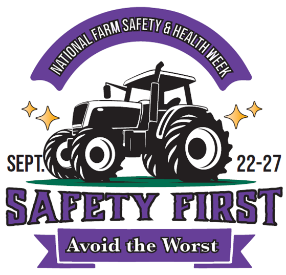Safety First, Avoid the Worst
How many farm safety articles have you read in the last 20 years? Do you find yourself zoning out or scanning for the next most interesting article because you’ve heard it all before? I’m not trying to be accusatory because that can describe any one of us at times.
However, consider that it only takes a moment of distraction or carelessness on your part, or on someone else’s part, to change your life in the worst way.
With corn and soybean harvest approaching, and along with The National Education Center for Agricultural Safety (NECAS), I’d like to remind everyone: Safety First, Avoid the Worst. That is the theme of National Farm Safety and Health Week, September 21-27, 2025.
According to NECAS, the 2022 data for the U.S. Bureau of Labor Statistics indicates that the agricultural sector is still the most dangerous in America with 417 fatalities. Fall harvest time can be one of the busiest and most dangerous seasons of the year for the agriculture industry. For this reason, the third week of September has been recognized as National Farm Safety and Health Week. This annual promotion initiated by the National Safety Council has been proclaimed as such by each sitting U.S. President since Franklin D. Roosevelt in 1944. National Farm Safety and Health Week is led by the National Education Center for Agricultural Safety (NECAS), the agricultural partner of the National Safety Council. Find out more at https://www.necasag.org/.
You probably know some of the activities and inherent dangers at harvest time that involve combines, traveling on roads, grain bins, and Power Take-Off (PTO) equipment.
Most farmers are well aware of equipment hazards, but over time, we can all become complacent and somewhat overconfident. I have spoken to farmers who have survived accidents, and they all say something like, “I have done that a hundred times before, but…” Accidents with combines and other equipment can happen in an instant. Make sure the equipment is powered completely down before doing any maintenance.
Large farm equipment will be traveling on local roads for fall harvest operations. As a driver, it is easy to get frustrated when you’re in a hurry and stuck behind slow-moving equipment, but try to take a breath and be patient. Safety is important to everyone, farmers and drivers.
Look for Slow Moving Vehicle (SMV) emblems displayed on farm equipment and other vehicles. An SMV emblem is triangular, with an orange fluorescent center and red reflective borders. Equipment and other vehicles displaying this emblem are capable of speeds no faster than 25 miles per hour.
Farmers should recheck the condition of SMV emblems to make sure they are still fluorescent. Over time, these emblems can fade and become less noticeable. Other road-related safety equipment should also be checked, such as headlights, taillights, flashing lights, hitch pins, tires, and wheel bearings. Do an inventory and assessment now, before you get busy.
Grain bins present hazards of their own. Take safety precautions as you enter bins to prevent potential engulfment and suffocation. Use lock-out, tag-out procedures, and never work alone. Other hazards include grain dust explosions, falls, and working around the mechanical equipment associated with grain handling and storage. Find more information at https://www.osha.gov/grain-handling.
Augers and other PTO-powered equipment present a real and present danger of entanglement. Make sure all safety guards are in place and functioning properly, and be mindful of frayed clothing or any action that could lead to entanglement. Stay clear of PTO shafts.
Finally, the Purdue Agricultural Safety & Health Program has just released its “2024 Indiana Farm Fatality Summary with Historical Overview.” I’ll be covering some highlights of that report next week. If you’d like to get a head start, find the report (and past year’s reports) under the “resources” tab at www.INPrepared.org.
So, prepare now and remain vigilant! Think: Safety First, Avoid the Worst.

Logo for National Farm Safety and Health Week from The National Education Center for Agricultural Safety (NECAS)
